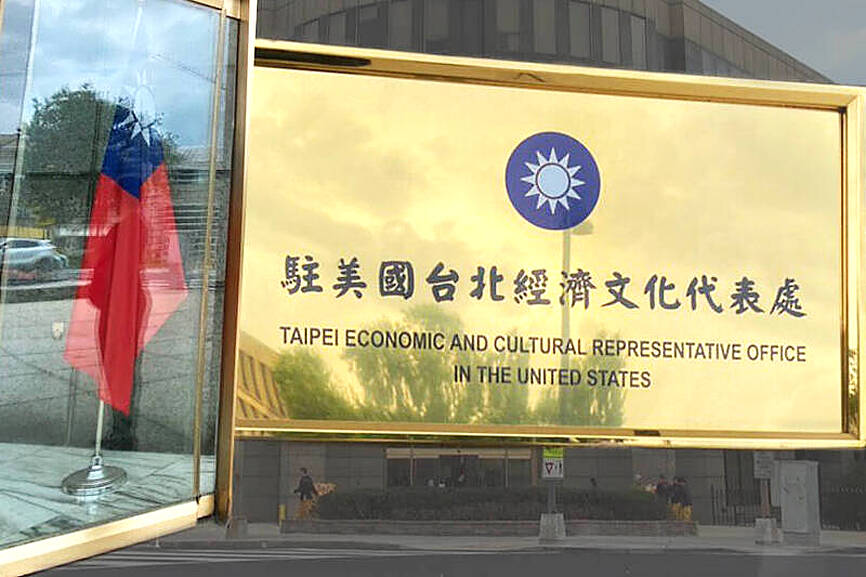Experts have expressed mixed opinions on a bipartisan US Senate proposal to rename Taiwan’s de facto embassy in Washington, with some praising its symbolic significance, while others warned of potential risks amid rising cross-strait tensions.
The bill, introduced on Wednesday, seeks to rename the Taipei Economic and Cultural Representative Office (TECRO) to the “Taiwan Representative Office” to better reflect “the reality” that it represents the people of Taiwan, according to its sponsors.
Republican US Senator John Curtis, who cosponsored the bill with Democratic Senator Jeff Merkley, said in a news release that the legislation “underscores the United States’ commitment to Taiwan’s democracy and enhances clarity in the US-Taiwan relationship.”

Photo: Taipei Times
In response to requests for comment, Global Taiwan Institute executive director Russell Hsiao (蕭良基) said there is hesitation within the policy community, and even among Taiwan supporters, to back what some view as symbolic gestures over more substantive measures.
“In my view, such criticisms are misplaced and symbolism has substance in the cross-strait context,” he said.
Meanwhile, Bonnie Glaser, director of the Indo-Pacific program at the German Marshall Fund, said that Taiwan should instead prioritize strengthening its defense and national security amid growing threats from China.
“I believe this is not the moment to focus on symbolic measures that could result in even more intense threats from Beijing,” she said.
Julian Ku (古舉倫), a Hofstra University law professor, said that while the bill enjoys broad congressional support, it may not be a legislative priority.
The proposal “seems more like a political issue related to what is going on in Congress right now, and my impression is that while there is broad support for a bill like this, it is just not very high on the agenda given all of the other priorities in Congress,” Ku said.
A name change does not require congressional approval — US Secretary of State Marco Rubio has the authority to approve it — but the timing remains uncertain amid upcoming US-China diplomatic engagements, Ku added.
Richard Bush, a Brookings Institution nonresident senior fellow, said that the final decision rests with US President Donald Trump.
While Rubio had previously introduced similar legislation as a senator, Bush said that his current role as secretary of state means the decision would ultimately be shaped by Trump’s broader China policy.
In 2023 and last year, similar bills were introduced in the US House and Senate, but failed to gain traction.
Curtis, then a House member, introduced one of the bills, while then-senator Rubio sponsored the other during former US president Joe Biden’s term.
Taiwan’s representative offices in countries with which it does not have diplomatic ties are typically named the Taipei Economic and Cultural Office or the Taipei Representative Office, in keeping with the host countries’ preference to avoid any references that would imply Taiwan is a separate country from China.
Since the severing of diplomatic ties between the US and Taiwan in 1979, Taiwan’s representative office in Washington has been referred to as TECRO.

Japanese footwear brand Onitsuka Tiger today issued a public apology and said it has suspended an employee amid allegations that the staff member discriminated against a Vietnamese customer at its Taipei 101 store. Posting on the social media platform Threads yesterday, a user said that an employee at the store said that “those shoes are very expensive” when her friend, who is a migrant worker from Vietnam, asked for assistance. The employee then ignored her until she asked again, to which she replied: "We don't have a size 37." The post had amassed nearly 26,000 likes and 916 comments as of this

US President Donald Trump said "it’s up to" Chinese President Xi Jinping (習近平) what China does on Taiwan, but that he would be "very unhappy" with a change in the "status quo," the New York Times said in an interview published yesterday. Xi "considers it to be a part of China, and that’s up to him what he’s going to be doing," Trump told the newspaper on Wednesday. "But I’ve expressed to him that I would be very unhappy if he did that, and I don’t think he’ll do that," he added. "I hope he doesn’t do that." Trump made the comments in

Tourism in Kenting fell to a historic low for the second consecutive year last year, impacting hotels and other local businesses that rely on a steady stream of domestic tourists, the latest data showed. A total of 2.139 million tourists visited Kenting last year, down slightly from 2.14 million in 2024, the data showed. The number of tourists who visited the national park on the Hengchun Peninsula peaked in 2015 at 8.37 million people. That number has been below 2.2 million for two years, although there was a spike in October last year due to multiple long weekends. The occupancy rate for hotels

A cold surge advisory was today issued for 18 cities and counties across Taiwan, with temperatures of below 10°C forecast during the day and into tonight, the Central Weather Administration (CWA) said. New Taipei City, Taipei, Taoyuan and Hsinchu, Miaoli and Yilan counties are expected to experience sustained temperatures of 10°C or lower, the CWA said. Temperatures are likely to temporarily drop below 10°C in most other areas, except Taitung, Pingtung, Penghu and Lienchiang (Matsu) counties, CWA data showed. The cold weather is being caused by a strong continental cold air mass, combined with radiative cooling, a process in which heat escapes from